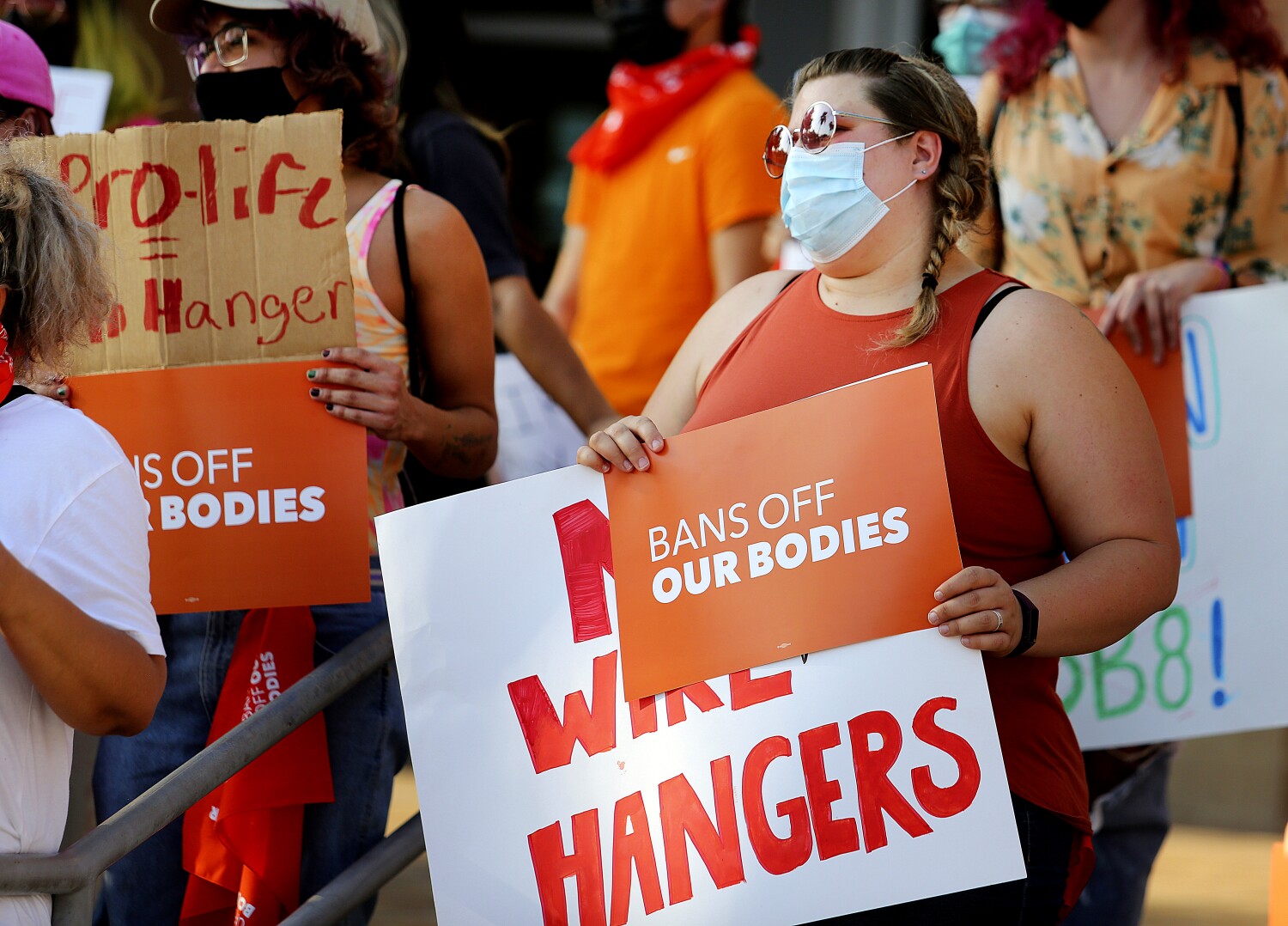Litman: The significance of a slim concern in Texas’ abortion ban

For a lot of observers, the case the Supreme Court docket heard Monday about Texas’ new abortion legislation is a sideshow, a “comparatively slim,” “merely procedural” footnote to the principle occasion, Dobbs vs. Jackson Ladies’s Well being Group, which will likely be argued in December and will overturn Roe vs. Wade as soon as and for all.
However in truth, what occurred Monday is way from a footnote to Roe.
The Texas legislation, generally known as SB 8, presents bedrock questions that go effectively past the abortion context to the very core of judicial energy and constitutional rule. The justices now have a possibility — and it appears probably they’ll take it up — to ship a ringing endorsement of the flexibility of residents to go to federal court docket to problem state efforts to abridge their constitutional rights.
The main focus of Monday’s listening to was the weird enforcement mechanism written into SB 8. The scheme, which Chief Justice John G. Roberts Jr. rightly known as “unprecedented” when the court docket first encountered it, is the invention of antiabortion advocates who aren’t glad with making an attempt to eviscerate Roe. They wish to preserve girls and abortion suppliers from going to court docket to struggle their clearly unconstitutional lawmaking — SB 8 bans abortion after about six weeks of being pregnant relatively than the 20 or so weeks (as much as viability) assured by present legislation.
In essence, SB 8’s drafters poked a loophole right into a 100-year-old Supreme Court docket doctrine generally known as Ex parte Younger, primarily based on a case involving a state legal professional basic named Edward Younger. It gives a solution to enjoin unconstitutional state statutes with out working afoul of “sovereign immunity,” which usually protects states from being sued. The answer the court docket imposed is a balancing act: Challengers can cease state officers, relatively than the state itself, from imposing a suspect legislation, till the constitutional questions are resolved.
SB 8 diabolically upends Ex parte Younger. It particularly prohibits state officers from having something to do with imposing the statute. As an alternative, non-public residents deliver swimsuit (and doubtlessly gather a $10,000 bounty) in opposition to anybody they imagine has obtained or offered an abortion after the prescribed restrict.
In different phrases, SB 8 is designed in order that there’s no entity to enjoin, no solution to freeze the legislation and power it into judicial evaluate. It’s true that if a lady (or a clinic) is sued underneath the statute, she may defend herself with a constitutional argument, and the legislation could possibly be challenged that approach. However no such swimsuit has been filed, and the specter of the $10,000 bounty mixed with the brief window of time to hunt an abortion has all however closed down the process within the state.
So long as SB 8 is in power, Texas’ antiabortion zealots can thumb their noses on the Supreme Court docket and Roe, the legislation of the land: neener neener.
Monday’s listening to was the court docket’s second swing at SB 8. It declined to remain it in September, all however throwing up its arms on the novelty of the no-one-to-enjoin scheme. However this week, no less than two of the beforehand flummoxed justices — Amy Coney Barrett and Brett M. Kavanaugh — appear to have remembered that they’re members of the Supreme Court docket of america, charged with the last word accountability to say what the legislation is and to vindicate residents’ constitutional rights. Barrett and Kavanaugh, whose recognition of a constitutional proper to abortion is probably going grudging at finest, had been having none of Texas’ rationales.
As Kavanaugh put it throughout the oral arguments: “So the query turns into, ought to we prolong the precept of Ex parte Younger to, in essence, shut [the Texas] loophole? … The entire sweep of Ex parte Younger” — its goal to supply a solution to problem unconstitutional state legal guidelines — “would recommend extending the precept right here, arguably.”
Precisely proper.
The conservative justices appointed by President Trump have begun to drive the court docket dangerously to the fitting, to the purpose the place a majority can implement views which might be grossly out of step with these of the authorized career and most residents. That’s dangerous for the court docket and for the nation.
However the tenor of the questioning on Monday was reassuring, no less than with respect to rules that transcend red-blue politics. It appears very potential that Roberts, the three liberal justices, and Kavanaugh and Barrett will do what Ex parte Younger did in 1908 — create doctrine that helps what’s foundational to our system: Federal legislation is supreme and the courts can be found to evaluate and enjoin unconstitutional legal guidelines.
Certainly, such an final result is so clearly the proper response to Texas’ neener-neener that it’s laborious to see on what foundation the three most conservative justices — Neil M. Gorsuch, Clarence Thomas and Samuel A. Alito Jr. — may dissent.
Regardless of the last tally, the opinion, as a substitute of a sideshow or a footnote, will likely be one for the books.


